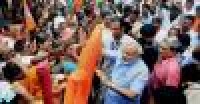Not enough direct accountability

TALKING MEDIA
Sevanti Ninan
Earlier this month Afghanistan voted in an election which marked the country’s first democratic transfer of power. Its far younger television news industry gave voters several direct interviews with candidates and at least three presidential debates to cover eleven candidates, some of them experienced administrators, others former warlords.
People braved political participation despite continuing insurgent attacks, ‘so those vying for their vote felt they owed voters a measure of direct accountability. Even as the debates were held under heavy security cover. The Independent of UK quoted a youth organiser saying that a debate, “gives you a sense of who the candidates are. You hear their vision straight from their own mouth, instead getting it filtered through gossip or word of mouth...” Viewers heard where each aspirant stood on the US security deal, on peace talks with the Taliban, on the economy, corruption and women’s rights.
The debates were on Tolo News, Radio Free Afghanistan and Afghan National Radio and TV. Political debates on TV in Afghanistan began in 2012 with a collaboration between the BBC and the country’s own public broadcaster. Once he saw their potential, president Hamid Karzai decided he would go on the Open Jirga programmes too, and did. Now in a poll year the format is fulfilling its potential.
How different things are here. After at least eight months of frenetic coverage we have no details from the horses’ mouths about how they will give shape to their poll promises (The honourable exception always is Arvind Kejriwal). Narendra Modi prefers rallies to interviews unless they are on safe territory as last week’s encounter with Rajat Sharma on India TV was. When Rahul Gandhi submitted to an interview in January he was applauded for his courage rather than his performance. When he decided he was ready for a second big one, his interviewer decided he deserved an easier time this time around.
Indians consume election time TV debates every day without getting anywhere near the direct accountability the Afghans got. Only one out of three leading personalities was accessible, for the others we were fobbed off with replies from combative party spokespersons. Kejriwal took every interview or debate forum head on, even when the questions stumped him. But this may be changing as Modi opens up as the polling nears its final stages.
When will we get purposeful television debates between leading candidates? There is a role for the public broadcaster here but which chief ministerial aspirant has submitted to a debate with his opposing candidates? Can one imagine Jayalalitha deigning to grace such a format? But there was a beginning this time around in at least one constituency. In “Chandigarh Thumakda’’, the candidates took part in an NDTV debate moderated by Barkha Dutt at a table in a sweet shop! All three answering the same questions, Pavan Kumar Bansal listening poker-faced to Gul Panag and then responding. Heated, but useful for the voter.
Nor has there been much structured accountability even after someone is elected. Sanjay Baru his former press advisor lauds prime minister Manmohan Singh’s willingness to address a press conference in his first term. Basic accountability in a 66-year-old democracy becomes an act of courage to be applauded. In the capital city there have been three prime ministerial press conferences in ten years, the second only with TV editors. Singh was happier with small controlled interactions at his house with handpicked people.
As each successive poll brings us closer to a “Modi Sarkar” we have to wonder about how publicly accountable Mr Modi will be if he does become prime minister. His campaign has been an object lesson on using extraordinary organisation to bypass the mainstream media. Ten websites, a YouTube channel, teams that work the crowd at rallies to get volunteers, someone who shoots off instantly converted footage to be put on a range of digital media including YuvaiTV, even as a rally is unfolding. What’s more, the campaign aims at 5000 web volunteers per urban constituency. It is not relying on journalists to communicate through.
In her book, Modi Muslims and Media, Madhu Kishwar explains why the conduct of the mainstream media has made him turn to social media. No great surprises there. She also gives us a run down on all the leading journalists who have offended Modi, with the precise provocation cited. Not many surprises in the list either, with NDTV as a news organisation getting top billing.
More interesting is Kishwar’s nugget on how far back Modi’s distrust of journalists goes. To 2001 when his work for the party in Delhi brought him into contact with them. Not that there was much more warmth for the local Gujarati press. Here was one chief minister who issued a bullet statement in place of a press conference the first time he was elected in October 2001.
What we have then is the prospect of a new prime minister who is inclined to keep the media in its place. But since the numbers of media organisations warmly disposed towards his party are growing every day, he might seek to reach out to them after all.
As he did just last night (April 16) in his interview to ANI spelling out his stand on various issues, including The Apology.
Reprinted with changes, from Mint, April 17, 2014